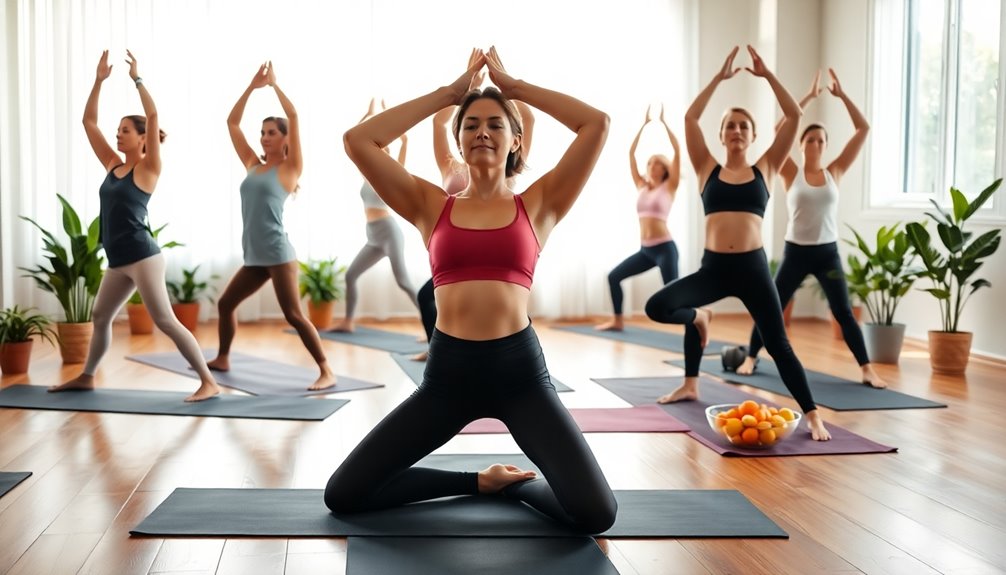Yoga helps you reduce stress and aid weight loss through its unique blend of physical postures, breathing techniques, and mindfulness. When you practice yoga, you activate your body's relaxation response, lowering stress hormone levels like cortisol. This not only calms your mind but also enhances emotional regulation. Additionally, engaging in strength-building poses boosts your metabolism and supports healthier choices, helping you shed those extra pounds. Breathing exercises further unite the mind and body, optimizing oxygen intake. By committing to a consistent practice, you can experience a profound transformation. There's so much more to discover about this journey toward wellness.
Key Takeaways
- Yoga promotes relaxation and mindfulness, effectively reducing stress and fostering a calm state of mind.
- Specific yoga postures, like Warrior II and Plank Pose, enhance muscle strength and aid in weight loss.
- Deep breathing techniques practiced in yoga, such as diaphragmatic breathing, increase oxygen flow and support fat burning.
- Regular yoga practice balances hormones, reduces cortisol levels, and improves emotional regulation, contributing to weight loss efforts.
- A consistent yoga routine of just 10-15 minutes daily can significantly impact stress levels and overall well-being.
The Science of Stress Reduction

When life feels overwhelming, understanding the science of stress reduction can empower you to take control. The relationship between your mind and body plays an essential role in how you experience and manage stress. This mind-body connection means that your mental state directly influences your physical well-being. When you're stressed, your body reacts with increased heart rate and muscle tension, which only heightens the feeling of being overwhelmed.
To counteract this, you can tap into the relaxation response, a state of deep rest that counteracts stress. This response can be triggered through various techniques, such as deep breathing, meditation, or gentle movement. When you engage in these practices, you send signals to your brain that it's time to relax, ultimately lowering stress hormone levels and promoting a sense of calm. Additionally, incorporating mindfulness meditation into your routine can further enhance your ability to manage stress effectively.
Taking time to cultivate this relaxation response not only helps you feel more centered but also improves your overall health. By consciously working on reducing stress, you foster a sense of belonging within yourself. It creates a space for self-acceptance and understanding, allowing you to connect better with those around you.
Yoga's Role in Mindfulness

Yoga serves as a powerful tool for cultivating mindfulness, offering you a structured pathway to connect with the present moment. By engaging in yoga, you create a space to tune into your body, breath, and thoughts, fostering a deeper awareness of yourself and your emotions. This practice encourages you to let go of distractions, allowing you to experience the here and now fully.
One of the key mindfulness benefits you gain from yoga is enhanced emotional regulation. When you practice mindful breathing and movement, you learn to observe your emotions without judgment. This skill helps you respond to stress and challenges more effectively, rather than reacting impulsively.
You begin to notice patterns in your emotional responses, which empowers you to choose healthier ways to cope.
As you integrate mindfulness into your yoga practice, you may also find that it spills over into your daily life. You'll become more attuned to your thoughts and feelings, making it easier to manage stress and anxiety. This heightened awareness builds a sense of belonging, as you learn to connect more deeply with yourself and others.
Incorporating techniques from programs like InnaPeace can further enhance your mindfulness practice by utilizing brainwave guidance technology to deepen relaxation and stress release.
Embracing mindfulness through yoga not only enriches your practice but also enhances your overall well-being. The journey encourages you to be gentle with yourself, recognizing that it's okay to experience a range of emotions. Through this process, you'll discover a supportive community that shares your desire for growth and connection, making your mindfulness journey even more rewarding.
Physical Postures for Weight Loss

How can physical postures in yoga aid your weight loss journey? When you practice yoga, you're not just stretching; you're building a profound mind-body connection that enhances your awareness of your body and its needs. This awareness can lead to healthier choices and a deeper appreciation for your body, encouraging you to treat it well.
Engaging in various yoga postures helps increase your muscle strength, which is essential for burning calories effectively. The more muscle you have, the more calories you'll burn even when you're at rest. Below is a table highlighting some effective yoga poses for weight loss:
| Yoga Pose | Benefits |
|---|---|
| Warrior II | Builds leg strength and endurance |
| Plank Pose | Strengthens core and arms |
| Boat Pose | Engages abdominal muscles |
As you integrate these postures into your routine, you'll likely notice changes in your body composition and overall energy levels. Remember, every small step counts in your weight loss journey. Lean into the community around you; share your experiences and progress with fellow yogis. Additionally, incorporating glute-specific movements can further enhance your workout efficiency and support your weight loss goals.
Ultimately, yoga isn't just a workout; it's a holistic approach to weight loss. By nurturing the mind-body connection and enhancing muscle strength, you're empowering yourself to achieve your goals while fostering a sense of belonging among those who share your path. Embrace the journey—it's uniquely yours!
Breathing Techniques Explained

Incorporating breathing techniques into your yoga practice can greatly enhance your weight loss efforts and overall well-being. Breathing exercises aren't just about inhaling and exhaling; they're powerful tools that can help you manage stress and improve your focus during your sessions. When you engage in conscious breathing, you bring your attention back to the present moment, allowing for a deeper connection between your mind and body.
One effective breathing technique is diaphragmatic breathing. By focusing on your diaphragm, you increase oxygen flow while promoting relaxation. Start by sitting or lying comfortably, placing one hand on your chest and the other on your belly. Inhale deeply through your nose, feeling your belly rise while your chest remains relatively still. Exhale slowly through your mouth, feeling your belly fall. This simple exercise helps lower stress hormones and can aid in weight loss by encouraging mindfulness in your eating habits.
Another valuable practice is the 4-7-8 technique, which involves inhaling for four counts, holding for seven, and exhaling for eight. This relaxation technique not only calms your mind but also helps regulate your body's response to stress, making it easier to let go of emotional eating. Furthermore, optimizing your oxygen intake can lead to burning an extra 3.5 pounds of body fat per month.
Hormonal Balance and Yoga

Achieving hormonal balance is essential for both stress management and weight loss, and yoga serves as a powerful ally in this pursuit. When you're stressed, your body's hormonal regulation can go awry, leading to weight gain and other health issues. By practicing yoga, you can help restore this balance, allowing you to feel more centered and in control.
Yoga encourages mindfulness and deep breathing, which are pivotal for reducing cortisol levels—the hormone linked to stress. As you flow through your poses, you not only release tension but also stimulate the endocrine system, promoting the production of hormones that support weight loss and overall well-being. This combination of physical movement and mental focus helps create a harmonious environment in your body, which is essential for maintaining hormonal balance.
You might feel a sense of community and belonging as you practice yoga with others who share similar goals. This supportive atmosphere fosters emotional connections and encourages accountability, making it easier to commit to your wellness journey. As you engage in consistent practice, you'll likely find that your body responds positively, improving your mood and energy levels.
Building a Consistent Practice

While it might feel challenging to establish a regular yoga routine amidst a busy schedule, building a consistent practice is essential for reaping the full benefits of yoga for stress and weight loss. To make it easier, you'll want to contemplate your time commitment. Start small—setting aside just 10-15 minutes a day can make a significant difference. As you become more comfortable, gradually increase the duration. This way, you won't feel overwhelmed, and you're more likely to stick with it.
Next, let's talk about motivation strategies. Finding what drives you is key. Maybe it's the sense of community you feel in group classes or the peace of practicing alone at home. Whichever you choose, surround yourself with supportive people who encourage your journey. You could also set specific goals, like mastering a pose or attending a certain number of classes each week. Celebrating small victories along the way can keep your spirits high.
Creating a dedicated space for your practice may also enhance your commitment. Whether it's a corner in your living room or a quiet spot outdoors, having a designated space helps signal your mind that it's time to practice.
Yoga Styles for Stress Relief

Finding the right yoga style can be a game-changer for handling stress. When you're maneuvering through life's challenges, the right practice can create a sanctuary for your mind and body. If you're seeking relief, consider incorporating restorative poses into your routine. These poses focus on relaxation and help calm your nervous system, allowing you to unwind deeply. You might find yourself supported by props, such as blankets and bolsters, which create a sense of safety and comfort.
Gentle flows are another excellent option for stress relief. Unlike fast-paced styles, gentle flows allow you to connect with your breath and move mindfully through each pose. This slower pace helps you tune into your body and release any pent-up tension.
You'll find that by focusing on fluid movements, your stress begins to melt away, leaving you feeling refreshed. Interestingly, the real cause of falls can be linked to how stress affects your balance and stability, underscoring the importance of maintaining a calm mind.
Both restorative poses and gentle flows foster a sense of community. Many yoga studios offer classes that encourage connection with others who share your journey. This sense of belonging can be incredibly comforting during difficult times.
As you explore these styles, remember to listen to your body and honor what feels right for you.
Ultimately, the key is to find a practice that resonates with you. Embrace the journey of discovering what brings you peace, and you'll find that handling stress becomes much more achievable. Your yoga practice can be a source of strength and solace, guiding you toward a more balanced life.
Nutrition and Yoga Synergy

Yoga not only nurtures your mind and body, but it can also greatly enhance your nutrition choices. When you engage in a regular yoga practice, you become more attuned to your body's needs, which can lead to healthier dietary habits. This heightened awareness encourages you to listen to your hunger cues and cravings, helping you make better food choices that align with your wellness routine.
Integrating yoga into your life doesn't just improve your physical flexibility; it also opens the door to a more mindful approach to eating. You may find yourself gravitating toward whole, nutrient-rich foods instead of processed options. This shift isn't just about weight loss; it's about fostering a deeper connection with what you put into your body.
As you flow through your yoga sessions, consider how each pose can mirror your nutrition journey. Just as you stretch and strengthen your muscles, you can also expand your palate and embrace new flavors and textures.
Moreover, practicing yoga can help reduce stress, which is often linked to unhealthy eating patterns. By calming your mind on the mat, you can cultivate a sense of peace that translates into your kitchen. You'll likely feel less inclined to reach for comfort foods when you create space for mindfulness. Additionally, adopting a plant-based diet can further enhance your overall health and support your weight loss efforts.
Real-Life Success Stories

Transforming lives through yoga isn't just a concept; it's a reality for many who have embraced this practice. You might find inspiration in the personal transformations of those who were once overwhelmed by stress and struggled with weight management. These stories highlight how yoga can foster mental clarity and emotional balance, creating a sense of belonging within a supportive community.
Here's a glimpse into some real-life success stories:
| Name | Transformation Story |
|---|---|
| Emily | After a year of yoga, Emily lost 30 pounds and feels more confident. |
| James | Yoga helped James manage his anxiety, giving him mental clarity for better decision-making. |
| Sarah | Sarah discovered a new sense of community through yoga, making lasting friendships while shedding 20 pounds. |
| Mike | Mike's yoga practice transformed his relationship with food, leading to healthier choices and a 25-pound loss. |
| Lisa | Overcoming stress through yoga, Lisa reports feeling rejuvenated and focused, with a 15-pound weight loss. |
These stories show that yoga isn't just about poses; it's about forging connections, discovering inner strength, and fostering resilience. As you step onto your mat, remember that you're not alone in your journey. Like others, you can achieve personal transformations that extend beyond the physical. Embrace the practice and watch as it nurtures your mental clarity and overall well-being. You belong to a community that supports your growth every step of the way.
Frequently Asked Questions
Can Beginners Practice Yoga for Stress Relief and Weight Loss?
Yes, you can definitely practice yoga as a beginner for stress relief and weight loss. Focus on proper form to avoid injuries and enhance your experience. Incorporating breathing techniques will help you stay centered and calm, making your sessions more effective. Start with gentle poses, listen to your body, and gradually build your strength and flexibility. Remember, it's about progress, not perfection, so enjoy the journey and connect with your practice.
How Often Should I Practice Yoga for Optimal Results?
If you want to see real results, think of your yoga practice like a Netflix binge—you don't just watch one episode!
Aim for at least three to five sessions a week, mixing up yoga frequency and intensity to keep things fresh. This approach helps you build strength and flexibility while maintaining your enthusiasm.
What Equipment Do I Need to Start Yoga?
To start your yoga journey, you don't need much equipment. A good yoga mat is essential; it provides stability and comfort during your practice.
Also, wear comfortable clothing that allows you to move freely. Think about materials that breathe and stretch with you. Remember, it's about finding what feels right for you.
With these simple items, you'll create a welcoming space that encourages growth and connection within your practice. Enjoy your journey!
Are There Any Risks Associated With Practicing Yoga?
When practicing yoga, being aware of potential risks is crucial. Yoga injuries can occur if you push yourself too hard or don't listen to your body. Prioritize practicing with mindfulness, using proper alignment and modifications when necessary.
Keep in mind, yoga is about personal growth, not comparison. If you're ever unsure, consider seeking guidance from a qualified instructor. This way, you can enjoy the benefits while minimizing risks and feeling secure in your practice.
Can Yoga Be Combined With Other Forms of Exercise?
Absolutely, yoga can be combined with other forms of exercise! It serves as a fantastic cross-training option, enhancing your flexibility and balance while you engage in more intense workouts. Think about pairing it with activities like running or strength training, as these complementary activities can boost your overall fitness.
Conclusion
Incorporating yoga into your routine can transform your life, much like how the ancient sages found peace amid chaos. By embracing mindfulness, mastering breathing techniques, and committing to a consistent practice, you can effectively reduce stress and support your weight loss journey. Remember, it's not just about the poses; it's about nurturing your body and mind. As you explore different yoga styles and integrate healthy nutrition, you'll discover a holistic approach to well-being that resonates with your unique journey.



